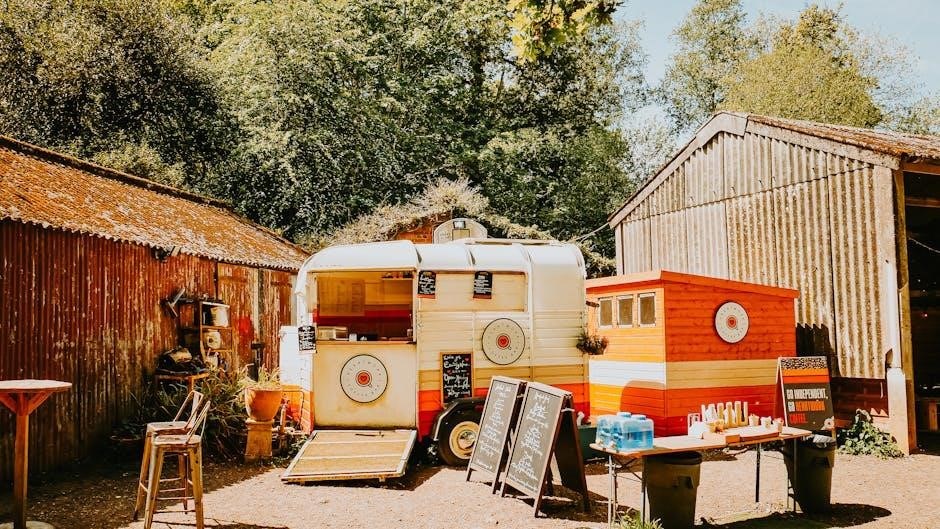coffee truck business plan pdf

Executive Summary
This executive summary outlines the purpose and scope of the coffee truck business plan‚ detailing the concept‚ target market‚ operational strategy‚ and financial projections for success․
1․1 Overview of the Coffee Truck Business
The coffee truck business offers specialty coffee and beverages through a mobile platform‚ targeting busy individuals in high-traffic areas․ With lower startup costs than a café‚ it provides flexibility to cater to diverse locations and events․ The business focuses on quality‚ convenience‚ and personalized service‚ capitalizing on the growing demand for premium coffee․
1․2 Vision and Mission Statement
Our vision is to become the leading mobile coffee provider‚ delivering exceptional quality and convenience․ Our mission is to serve premium‚ expertly crafted coffee to busy individuals‚ fostering community connections and exceeding customer expectations through personalized service and sustainable practices․

Market Analysis
The coffee truck industry is growing rapidly‚ driven by increasing demand for specialty coffee and convenience․ Targeting busy professionals and urban areas‚ the market offers significant opportunities for mobile coffee vendors to thrive․
2․1 Industry Overview and Trends
The coffee truck industry is thriving‚ driven by rising demand for specialty coffee and convenience․ With a market size exceeding $1․2 billion‚ the sector has seen 12․4% growth over five years․ Trends include premium coffee‚ eco-friendly practices‚ and mobile accessibility‚ making coffee trucks a popular choice for urban‚ on-the-go consumers seeking high-quality beverages․
2․2 Target Market Identification
The primary target market includes busy professionals‚ students‚ and urban dwellers seeking convenient‚ high-quality coffee․ Key demographics are individuals aged 18-45‚ middle to upper-income brackets‚ and those prioritizing health-conscious‚ ethically sourced products․ Additional opportunities exist in corporate events‚ festivals‚ and high-traffic locations‚ catering to diverse customer needs and preferences for specialty beverages․
2․3 Competitive Analysis
The mobile coffee industry is competitive‚ with established players like Travelin’ Tom’s Coffee Truck and emerging startups․ Key competitors focus on quality‚ convenience‚ and customer loyalty․ Differentiation strategies include premium products‚ unique menu offerings‚ and personalized service․ A focus on sustainability and ethical sourcing can further set your business apart in a crowded market․
Services and Menu Offerings
Offer premium specialty coffee drinks‚ espresso-based beverages‚ and complementary food pairings․ The menu features high-quality‚ ethically sourced ingredients‚ catering to diverse customer tastes and preferences for a unique experience․
3;1 Coffee and Specialty Drinks
Offer a variety of specialty coffee drinks‚ including espresso‚ cappuccinos‚ lattes‚ and cold brew․ Source high-quality‚ ethically sourced beans to ensure rich flavors․ Provide customizable options‚ such as dairy-free milk alternatives and flavored syrups‚ to cater to diverse customer preferences and dietary needs‚ ensuring a premium experience for coffee lovers on the go․
3․2 Food Pairings and Additional Menu Items
Offer a selection of pastries‚ muffins‚ cookies‚ and light bites to complement coffee drinks․ Provide fresh‚ high-quality items perfect for grab-and-go customers․ Include vegan and gluten-free options to cater to diverse dietary needs․ This menu strategy enhances the overall coffee experience‚ providing customers with a convenient and satisfying pairing for their beverages․
3․4 Catering and Event Services
Offer customizable catering services for events like weddings‚ corporate functions‚ and festivals․ Provide tailored coffee and specialty drink menus‚ paired with pastries and snacks․ Equip the truck with necessary gear to ensure smooth service at any location․ This service expands revenue streams and builds brand visibility through event participation and partnerships․
Marketing and Sales Strategy
Develop a strong brand identity‚ leverage social media‚ and implement targeted promotions to attract customers․ Use location data to optimize routes and maximize visibility‚ ensuring consistent engagement and sales growth․
4․1 Branding and Brand Identity
Create a unique and recognizable brand for your coffee truck business․ Develop a strong logo‚ color scheme‚ and tagline that reflect your values and mission․ Establish a consistent visual identity across all platforms‚ including the truck‚ packaging‚ and social media․ Build brand loyalty by offering exceptional quality and personalized customer experiences that resonate with your target audience․
4․2 Location Selection and Route Planning
Select high-traffic locations like business districts‚ events‚ and popular landmarks to maximize visibility and sales․ Analyze competition and customer demand to optimize route planning․ Develop a schedule that ensures regular stops at profitable locations‚ adapting based on customer feedback and seasonal trends to maintain efficiency and customer satisfaction․
4․3 Promotional Tactics and Social Media
Implement promotional tactics like discounts‚ referral programs‚ and partnerships with local businesses․ Leverage social media platforms to engage customers‚ share updates‚ and showcase products․ Use Instagram and Facebook for visual storytelling‚ hashtag campaigns‚ and location-based ads․ Maintain a strong online presence to build brand loyalty and attract new customers through interactive content and community building․

Operations Plan
This section details the setup of the coffee truck‚ equipment‚ supply chain management‚ and health standards to ensure efficient and safe daily operations․
5․1 Coffee Truck Setup and Equipment
The coffee truck setup includes essential equipment like espresso machines‚ grinders‚ brewers‚ and water tanks․ The layout prioritizes efficiency‚ with a customer-friendly design; Initial investment ranges from $20‚000 to $75‚000‚ covering equipment‚ vehicle customization‚ and necessary utilities․ Proper setup ensures smooth workflow‚ safety‚ and scalability for daily operations․
5․2 Staffing and Training
The coffee truck business requires 1-2 trained baristas per shift‚ depending on volume․ Staffing includes hiring skilled individuals with coffee expertise and excellent customer service skills․ Training covers coffee preparation‚ equipment operation‚ and customer interaction․ Ongoing education ensures high-quality service‚ adapts to trends‚ and maintains operational efficiency‚ crucial for business growth and customer satisfaction․
5․3 Supply Chain and Inventory Management
A reliable supply chain ensures quality ingredients and timely restocking of coffee beans‚ milk‚ and other essentials․ Inventory management involves tracking stock levels to prevent shortages and waste․ Regular audits and efficient ordering systems maintain optimal supply levels‚ ensuring smooth operations and freshness of products for customer satisfaction․
Financial Plan
The financial plan outlines startup costs‚ revenue projections‚ and funding strategies to ensure the coffee truck business achieves profitability and sustainability‚ with clear break-even analysis and cash flow management․
6․1 Startup Costs and Budgeting
Startup costs for a coffee truck business range from $20‚000 to $75‚000‚ with key expenses including the truck‚ equipment‚ permits‚ and initial inventory․ Budgeting is crucial to manage these expenses effectively‚ ensuring funds are allocated appropriately for operations‚ marketing‚ and contingency planning to sustain the business during its initial phase․
6․2 Revenue Projections and Pricing Strategy
Revenue projections estimate $250-$300 daily‚ with an average sale of $5 per customer․ Pricing strategy balances affordability and quality‚ targeting 100-150 cups sold daily․ Seasonal menu items and loyalty programs aim to boost sales and customer retention‚ ensuring steady revenue growth and profitability for the coffee truck business․
6․3 Funding and Investment Options
The coffee truck business requires an estimated $20‚000 to $75‚000 in startup costs‚ covering the truck‚ equipment‚ and initial operations․ Funding can be sourced through small business loans‚ private investors‚ or crowdfunding platforms․ A detailed financial plan is crucial for securing investments and ensuring long-term profitability․ This approach ensures sustainability and scalability․
Legal and Regulatory Requirements
Obtaining necessary licenses‚ permits‚ and health certifications is essential for legal operation․ Compliance with local food safety regulations and insurance coverage are critical for risk mitigation and operational legitimacy;
7․1 Licensing and Permits
Securing the necessary licenses and permits is crucial for legal operation․ This includes a food service permit‚ business registration‚ and health department certification․ Additional permits may be required for specific locations or events‚ ensuring compliance with local regulations and enabling smooth operations across various jurisdictions․
7․2 Health and Safety Compliance
Ensuring health and safety is critical for a coffee truck business․ Regular inspections‚ proper food handling‚ and waste disposal are essential․ Staff must be trained on hygiene and safety protocols to meet health codes․ Compliance builds customer trust and ensures uninterrupted operations while safeguarding both employees and customers․
7․3 Insurance and Liability Coverage
Obtaining the right insurance and liability coverage is essential for a coffee truck business․ This includes general liability‚ commercial auto insurance‚ and equipment coverage․ Insurance protects against accidents‚ property damage‚ and employee injuries․ Adequate coverage ensures legal compliance and safeguards the business from potential risks‚ providing peace of mind and financial security․
Launch and Growth Strategy
A successful launch involves pre-launch testing‚ grand opening events‚ and customer acquisition tactics․ Growth strategies include scaling operations‚ expanding locations‚ and exploring new markets to ensure long-term business success․
8․1 Pre-Launch Preparation and Testing
Pre-launch preparation involves finalizing the menu‚ testing equipment‚ and training staff․ Conduct market research‚ secure permits‚ and refine operational workflows․ Soft launches and trial events help identify and address potential issues before the official launch‚ ensuring a smooth transition into full-scale operations and customer satisfaction from day one․

8․2 Launch Plan and Grand Opening
The launch plan includes selecting a high-traffic location‚ promoting the grand opening through social media and local advertising‚ and offering special promotions to attract initial customers․ A well-executed grand opening event builds brand awareness‚ drives sales‚ and establishes the coffee truck as a welcoming and convenient destination for coffee lovers․
8․3 Scaling the Business and Expansion
Scaling involves introducing additional coffee trucks‚ expanding to new locations‚ and potentially franchising․ This phase includes diversifying the menu‚ exploring partnerships‚ and entering new markets․ Continuous monitoring of operations ensures sustained growth while maintaining quality and customer satisfaction‚ positioning the business for long-term success and market leadership in the mobile coffee industry․

Management and Team
The management team includes experienced founders skilled in coffee operations and business management․ The team focuses on delivering exceptional customer experiences‚ driving growth‚ and scaling operations effectively․
9․1 Key Roles and Responsibilities
The CEO oversees overall strategy and direction‚ while the COO manages daily operations․ The head barista ensures quality control‚ and the marketing manager handles branding and customer engagement․ Each role is critical to achieving business objectives and delivering exceptional customer experiences․ Clear responsibilities ensure efficient operations and contribute to the coffee truck’s success and growth․
9․2 Hiring and Employee Management
Hiring skilled baristas and staff is essential for delivering quality service․ Comprehensive training ensures familiarity with equipment‚ menu‚ and customer service standards․ Employee management focuses on fostering a positive work environment‚ flexible scheduling‚ and performance reviews to maintain high morale and productivity‚ ensuring the coffee truck operates efficiently and effectively every day․
9․3 Leadership and Decision-Making Process
Effective leadership ensures clear communication and a shared vision for the coffee truck business․ Decisions are made collaboratively‚ involving key team members to foster innovation and accountability․ The leadership team prioritizes adaptability‚ responding to market changes and customer feedback while maintaining a focus on long-term goals and operational efficiency․
This business plan outlines the vision‚ strategy‚ and roadmap for a successful mobile coffee truck venture․ It charts a course for achieving long-term success in the market․
10․1 Summary of the Business Plan
This business plan provides a comprehensive roadmap for launching and growing a coffee truck business‚ detailing market analysis‚ services‚ marketing strategies‚ financial projections‚ and operational plans to ensure long-term success and profitability in the mobile coffee industry․